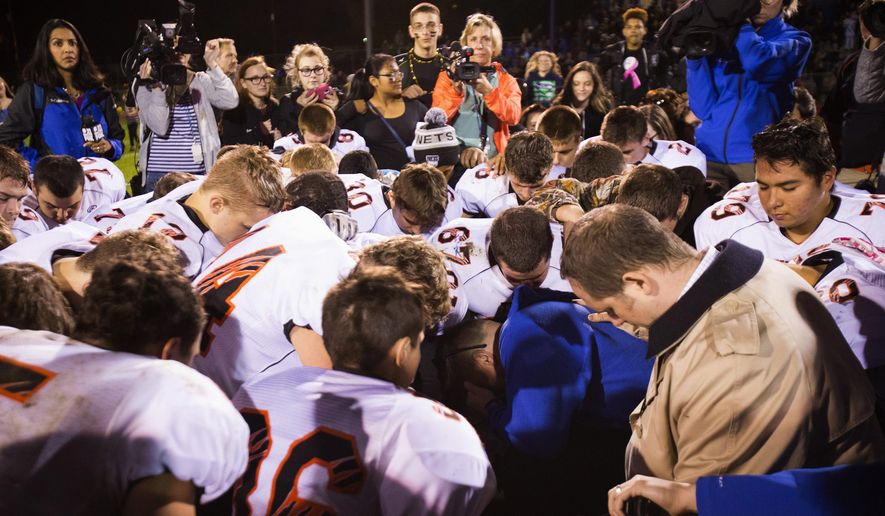A former high school football coach has filed a federal lawsuit against a Washington state school district after he lost his job for praying on the 50-yard line after games.
Joe Kennedy said he isn’t suing the Bremerton School District for monetary damages. The coach said he only wants his job back and the ability to live consistently with the tenets of his faith.
“I really hope that the school district will give me my job back so I can get back to doing what I love most: coaching my players,” Mr. Kennedy said in a statement.
Mike Berry, senior counsel for the First Liberty Institute, which represents Mr. Kennedy, said the school district discriminated against his client on the basis of his religious beliefs in violation of the First Amendment and Title VII of the Civil Rights Act, which bars religious discrimination in employment.
“Citizens who work for government are not banned from praying. That’s now the law. That’s religious hostility and discrimination,” Mr. Berry said in a statement. “All we’re asking is for Coach Kennedy to be reinstated and for the school to allow him to continue to pray alone at the 50 yard line after the game.”
Mr. Kennedy started praying after games when he was hired as an assistant varsity football coach at Bremerton High School in 2008. At first, the prayers were solitary, 15- to 30-second exercises: bowing down and taking a knee at midfield to express gratitude for the health, safety and sportsmanship of the athletes.
Eventually, players began asking Mr. Kennedy whether they could join. The coach said they had a right to do whatever they wanted. The number of regular participants grew, and players from opposing teams often joined them. Mr. Kennedy said he neither encouraged nor discouraged students from participating.
The Bremerton School District directed Mr. Kennedy to stop the prayers after receiving word of his practice — a member of a visiting school had complimented the coach’s conduct to district officials. A district letter marked Oct. 16 expressly forbade the coach from praying at that night’s homecoming game.
But Mr. Kennedy publicly defied the order by taking a knee after the game with his players, students from the opposing team and various members of the community who came to show their support for the coach.
He was suspended later that month, a day before the final varsity game of the season. A negative performance review the following month — the first unfavorable evaluation he had ever received — cited his noncompliance with district policy on prayer and recommended that he not be rehired. The district later refused to renew his contract.
“If you just read between the lines, what that means is because he prayed, which was against district policy, that he wasn’t rehired,” Mr. Berry said.
The school district issued a statement Tuesday acknowledging the lawsuit but declining to comment.
Other legal fights over religion have broken out across the country. Last year, the Air Force Academy received complaints about players praying on the field before games. After an internal review, the academy found that the players’ right to pray on the field was protected.
Richard Katskee, legal director for Americans United for Separation of Church and State, said the relevant distinction in Mr. Kennedy’s case is whether his prayer was being conducted and perceived as that of a private citizen or public official. In this case, he said, Mr. Kennedy’s action was clearly as a public official and therefore impermissible.
“In coach Kennedy’s complaint — he spends a lot of time talking about how this is personal, individual prayer,” Mr. Katskee said. “But he’s doing it out in the middle of the field on the 50 yard line right after the game while surrounded by the players from both teams and the audience.”
Prayer from coaches puts “subtle, coercive pressure on students to participate,” even if they don’t share their coaches’ religious beliefs, he said.
“Federal courts have over and over again said, when you do that, you’re not acting as a private citizen praying, something that you have an absolute right to do; you’re acting as a school official, and you’re sending a message to the students that puts pressure on them to participate,” Mr. Katskee said.
The U.S. Supreme Court appeared to take this view in a 2000 case, Santa Fe Independent School District v. Doe, in which student-led and student-initiated prayer broadcast over the sound system at high school football games was found to have violated the Constitution’s establishment clause.
But Mr. Berry said such a reading of law badly misinterprets the scope of the establishment clause. He points to regular religious expression in the public square and by public officials dating to the nation’s founding.
“Whether they’re cake bakers or photographers or florists, you’re seeing people across the country being told your religious liberty ends basically when you leave your house or your church or your place of worship,” he said. “That’s what happens in communist countries, in North Korea, places like that. But in the United States, we’ve had freedom of religion since the founding of our nation.”
• Bradford Richardson can be reached at brichardson@washingtontimes.com.




Please read our comment policy before commenting.